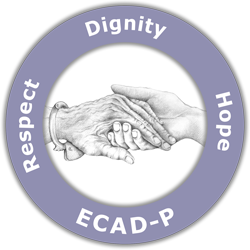Using E-Training to Enhance Geriatric and End-of-Life Care in Prisons
Klein Buendel Senior Scientist, Dr. Valerie Myers, presented preliminary findings from a project that provides e-training of inmate peer caregivers to enhance geriatric and end-of-life (EOL) care in prisons at the 40th Annual Meeting and Scientific Sessions of the Society of Behavioral Medicine (SBM), March 6-9, 2019 in Washington, DC.
The United States has an incarceration rate of 655 people per 100,000, making it the highest globally. The older adult segment of the prison population has more than tripled since 1990 and their health issues are comparable to those of free people who are 10-15 years their senior. Inmates over the age of 55 have a death rate that is 10 times that of prisoners aged 25-34. United States prison systems are facing increased demands in caring for aged and dying inmates. A systematic review revealed that inmate peer caregivers can figure prominently in delivery of EOL care in prison. However, the degree of training received by inmate peer caregivers varies widely.
The lack of consistent training points to a need for evidence-based, current, and readily accessible training for this population to mitigate the growing need for EOL care in United States prisons. In response to this need, the E-training of Inmate Peer Caregivers for Enhancing Geriatric and End-of-Life Care in Prisons project, will demonstrate the scientific merit and feasibility of developing cutting edge, media-rich learning modules to train inmate peer caregivers in geriatric and EOL care. The aims of the project are to: (1) transform best practices in inmate peer caregiving into a comprehensive training program that consists of media-rich and highly interactive computer-based learning modules for providing geriatric and EOL care to their peers; and (2) conduct in-person usability testing of the media-rich and highly interactive web-based prototypes with inmates who are currently Mental Health Peer Support Specialists (that is, prisoners who are experienced caregivers, but naïve to geriatric and EOL care) and prison staff to evaluate the user interface, ease of use, and perceived barriers in order to refine and optimize the product.
Focus groups were conducted with three different groups, inmates, IT staff, and interdisciplinary staff, at a men’s and a women’s state correctional institution to inform content and program development of the training modules. Focus group participants prioritized the Universal Precautions, Loss/Grief, and Role of Inmate Caregivers in the Final Hours modules. These modules will be programmed and tested in state prisons in a mid-Atlantic state. The System Usability Scale, a validated tool for assessing the usability and acceptability of technological products, will serve as the primary outcome.
This research was funded by a Small Business Technology Transfer (STTR) grant to Klein Buendel from the National Institute on Aging at the National Institutes of Health (AG057239; Dr. Susan Loeb, Principal Investigator) and Dr. Valerie Myers, Co-Investigator. Additional collaborators on the work presented at the conference include Dr. Erin Kitt-Lewis, Dr. Rachel Wion, and Julie Murphy from the Penn State University College of Nursing, and Tiffany Jerrod and Morgan Carter from Klein Buendel. The technology-based modules are being developed by the Creative Team at Klein Buendel.




